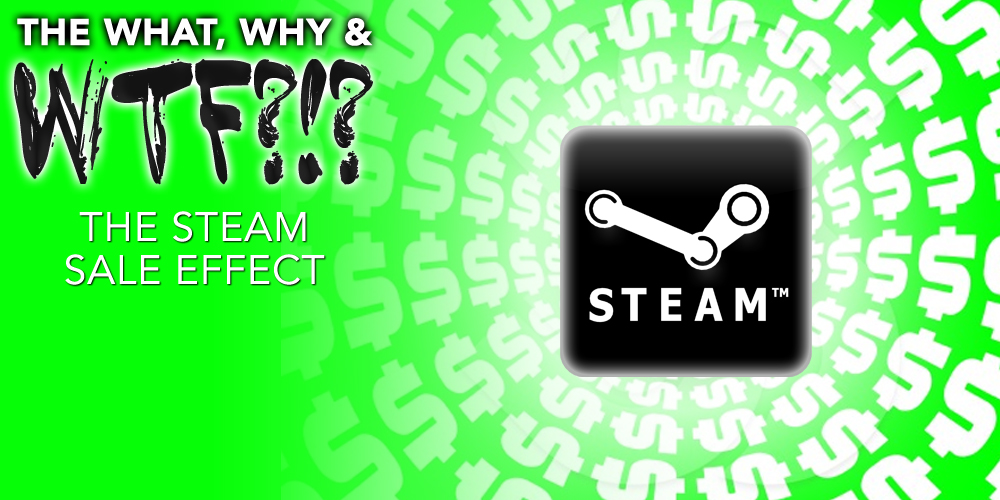
Oh dear god. It’s that time of year when piles of shame are born, bank accounts go dry and fully grown adults don’t eat. It’s Steam Sale season, and I am deeply afraid of how much money Valve will make off me this year. I’ve already spent a whole $5 on Shadow Warrior, but what absurdly low priced game is next?! This War of Mine? Scribblenauts? Saints Row Mother-Gatting 4!? I’m in an all too familiar mental state between dread and elation, a common symptom of gamers caught up in this well-priced hell.
Every time Steam has a sale, the internet rejoices as though The God King of Man is selling nude selfies of himself to reddit. That’s it, we’re done, time to start a new life drowning in excessively cheap video games and crippling debt… Well, there won’t be crippling debt because of those low prices, but you’ll certainly have less money than before. Time and time again, almost ritualistically, we buy gratuitous numbers of games because look at those deals. That soothing feeling of inevitability is part of something I like to call The Steam Sale Effect, and yes, it’s super effective.
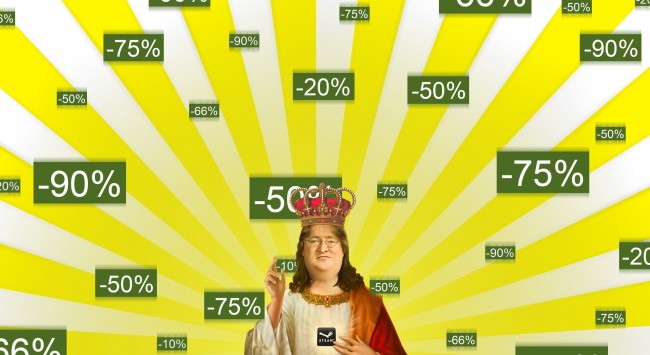
Pictured Above: Positive response
If you’ve never heard of the Steam sale, wow. Just wow. Valve’s digital marketplace, Steam, occasionally holds sales for all the games in their roster, and the reductions in price are ludicrous. Almost every game is at least 50% off, a lot are 75% off, and sometimes you’ll come across a 90% off game and puke leprechauns to restrain you from impulse buying it. You can buy FTL for $2.50 or Tomb Raider for $4. Those leprechauns crawling their way out yet? These sales have garnered a… Uh… Positive response from the gaming community while also fostering a cult-like spending frenzy.
People spend money during these sales, that’s a fact, but the amount people spend borders on the absurd. There are forums and trackers for Steam sales to help maximise spending efficiency and make sure you can afford rent tomorrow. What’s weird is that people are willing to then spend ludicrous amounts on these cheap games that they’ll never have time to play because, well, they’re cheap. I didn’t particularly want to buy Shadow Warrior, but I bought it like a bottle of vitamin D tablets because it was that cheap. These sales are effective – Really effective – despite being routinely dispensed.
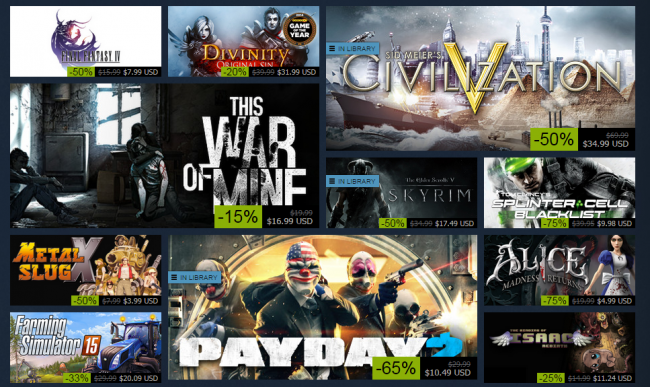
MUST. RESIST.
Even though Valve does not officially announce their sales prior to their harrowing appearance, Steam sales are guaranteed to occur around Christmas (Dec/Jan) and the American summer holidays (June/July). While you’d think that this would mean people would wait for the sales to buy anything, you’d be more wrong than a Nazi with a bestiality-BDSM fetish. Steam sales print money for devs well after the big sales are over because it provides a cheap entry point to breed loyal customers. So, if gamers are willing to spend money after the sale anyway, why do we spend so much during the sale?
While the ridiculous savings are certainly a motivating factor to spend all your money at once, they’re also serving another purpose. Steam sells digital goods that are nothing more than 0’s and 1’s. It’s not like stock is running out (or ever will), but these bargains will be out the door in less than a week! It’s a temporal form of artificial scarcity that helps create a sense of urgency even though the product isn’t going anywhere. This is also partly why Valve don’t formally announce their sales beforehand, because doing so would make the sale period less uncertain and anxiety-provoking. It’s this cultivated fear of missing out (yes, that is the technical term) that compels a lot of people to buy games by the truckload, even if that means spending money on games they’ll never play instead of risking paying more for them in the future. This is reinforced by the daily deals throughout the event.
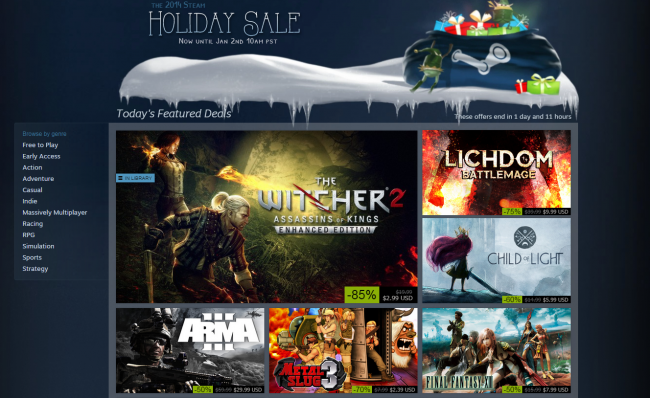
The first thing you see? 85% off. Eat that, Communism!
Daily deals are announced every 24 hours and generally offer the best savings. The deals themselves last for 48 hours but are hidden further down the store page after the first day. These are the first thing you see on the store page during a sale and not only reinforce the fear of missing out, they act as a variable ratio reward schedule. When you check for new deals, a game you take a fancy to may or may not be there with a deal you may or may not want to take advantage of. Sometimes you win and get a deal on a game you wanted and other times you don’t. It’s a bit like how poker machines operate in that you don’t always get what you want, but when you do, it’s enough to keep you coming back for more.
If the low prices weren’t enough to convince you that you should buy and buy now, Steam also works social engagement into the sale. Along with daily deals, the community can vote from a selection of games for one to be given a bigger discount the next day. You’re given a free trading card for voting and another reason to come back to the store the next day, not just to see if your game won but to see which game won. We generally see the actions of others as ‘more correct’ than our own, so finding out what other people voted for can steer us towards making a purchase. When all of these factors come together, we begin to see the emergence of The Steam Sale Effect a la Captain Planet minus the abs.
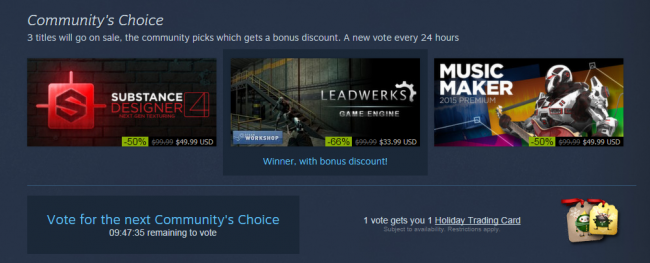
Don’t look at me, I voted for Kodos.
So, let’s say you finally gave into temptation and bought a game… Or five. The deal was ending soon and it was in the top sellers, so why not do the smart thing and buy them on the cheap. You might not get around to playing them all, but you’ll sure as hell try! Anyway, time goes by and you don’t end up playing them. Was buying them worth it? Well, hell yeah it was because they were cheaper. You never played them, but the transaction itself was enough to convince you that you made the right choice and leave you satisfied with the purchase. This is the Steam Sale Effect.
Regardless of the quality of the game(s) you buy, you’ll be satisfied with the purchase from the purchase itself. The seemingly crazy prices, the fear of missing out, the uncertainty on the daily deals and the knowledge that others are buying the game all serve to convince you that the purchase is solid. Knowing that you’ve saved money on this rare opportunity (that will happen in another six months or so) alleviates any worries you’ll have about whether the game(s) you’re buying is actually any good. The thing is, now is the time that you can take a risk on buying a potentially shitty game because it’s under half price! This means that regardless of the quality of the game itself, you’ll be satisfied with what you’re buying because you’re buying it right now, cheap, while it lasts.
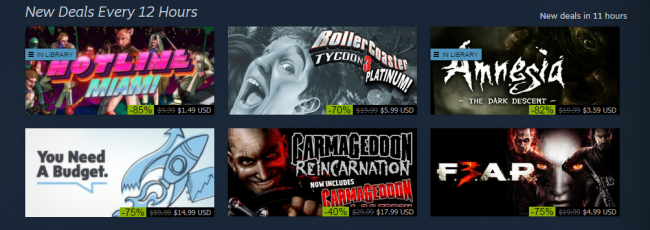
Funnily enough, I don’t own ‘You Need A Budget’.
… So you buy lots. Well, you might not, but people do, and it’s sometimes kinda worrying. When the purchase itself becomes more gratifying than the act of playing the game, it can become an unhealthy obsession. The stockpile of games that you don’t play grows and grows like a cyst on your left buttock that requires your attention but is forever ignored. The money you spent isn’t a good deal any more; it’s wasted. You’re not engaging with the game(s) you bought, so you might as well have just bought a juicer from an informercial instead. It’s also important to remember that, unlike physical stock, these video games will be around for as long as hard drives keep spinning. You’ll be able to buy them later, probably cheaper, but the Steam Sale Effect uses our own anxieties against us, and because of that, you must be callous with your spending.
These tactics are hardly new in the business world, but we’re no less swayed by their subtle usage. People can get bogged down by the savings and forget that they’ll never play the games they’ll buy. Driven by a fear of missing out and reassured by top sellers lists, it can be all too easy to forget that things that aren’t games need to be bought with the very money you’re potentially wasting. Don’t get me wrong, I love me some sweet deals, but I’m not just gonna go and buy The Witcher 2 for $3 or Spec Ops: The Line for $6. Or Battleblock Theatre for $1.50. Ah, screw it, not like they’ll be this cheap again any time soon anyway.
Editor’s Note: The What, Why, and WTF is a fortnightly an occasional article series that explores the culturally pervasive elements of gaming, those parts of video games that seem to have left some mark on gaming as a whole or Nick just finds really interesting. It is in no way an academic source, despite liking to pretend it is.











